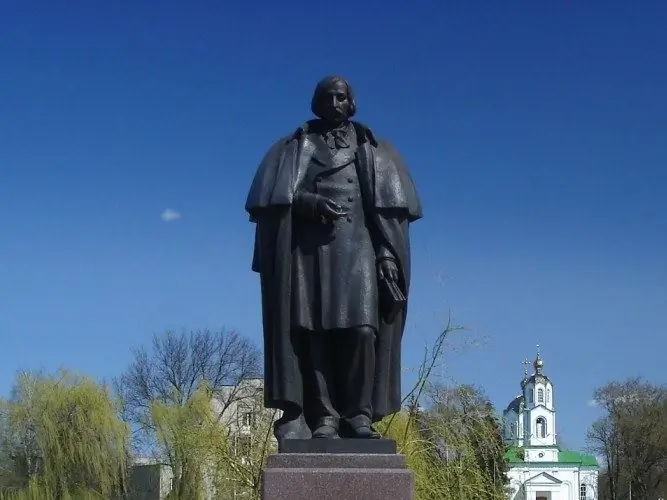- Author Antonio Harrison harrison@cultureoeuvre.com.
- Public 2023-12-16 07:44.
- Last modified 2025-01-22 21:44.
The great Russian writer Nikolai Gogol was distinguished by the versatility of his talent and the versatility of his works. He skillfully used folklore and ethnographic material in his work, some of his stories are imbued with subtle lyricism, romantic moods and humor. Gogol had a significant impact on the formation of the humanistic principles of Russian literature.

Where and when was Nikolai Gogol born
Gogol was born on March 20 (according to the new style - April 1) 1809 in the Mirgorodsky district of the Poltava province. The place of birth of the writer was the town of Velyki Sorochintsy.
Gogol's father was not the richest Ukrainian landowner Vasily Afanasyevich Gogol-Yanovsky.
Gogol's childhood was spent on the estate of his parents, which was located near the village of Dikanka. These were glorious places, described in detail in the annals. Literally an hour's drive from the estate was the Poltava field - the very place where the famous battle took place in its time. The historical motives of the native places covered with military glory were reflected in the subsequent work of Gogol.
The influence of relatives on the formation of a writer
Grandmother Tatyana Semyonovna had a great influence on the formation of the character of young Kolya. She taught the boy to draw, from her Gogol first heard the folk songs of the Ukrainian land. In the evenings, my grandmother told Nikolai legends and historical traditions, among which there were legends about the mighty Zaporozhye Cossacks, about the heroic history of the Ukrainian people.
Gogol's parents were fairly cultured people. My father knew how to tell interesting stories, was a great connoisseur and fan of the theater. At one time, Vasily Afanasyevich was even an actor and director of a home theater, which was arranged at his home by his distant relative. Plays in the theater were performed in Ukrainian, and the plots were borrowed from folk tales.
It was from his father that Nikolai Vasilyevich inherited his acting and writing talent.
Gogol's mother, Maria Ivanovna, was a rather religious and impressionable woman. From her, the future writer for the first time heard stories about the terrible torments of sinners, about the inevitable death of the world and the approaching end times. Mother instructed Gogol, punishing him to observe moral purity in the name of the future salvation of the soul. The images that were born in the boy's head, inspired by the instructions of his mother, were reflected in Gogol's reflections on human fate and the need for self-improvement.
From Maria Ivanovna, the writer inherited a very fine mental organization. Throughout his life, he was prone to religiosity, fear of God and excessive contemplation. The boy's childhood impressions of pagan folk beliefs, witches, devils, brownies and mermaids also found a place in his works. The impressionable soul of the future master of the word has absorbed many prejudices inherent in the people.






